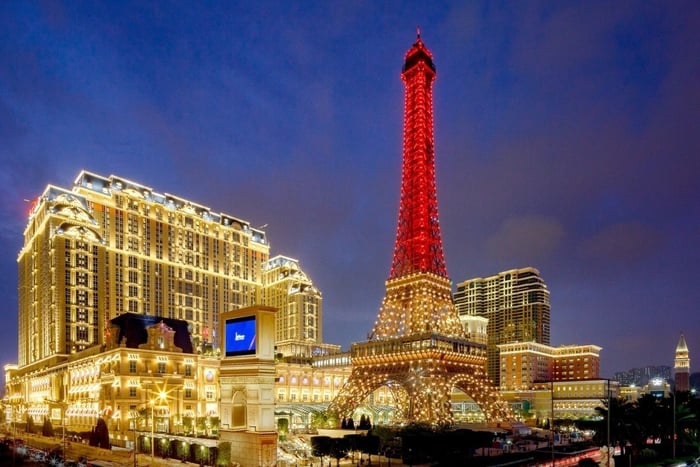If Macau casinos continue to coast on the backs of VIP gamblers, then it may mean they have gone as far as they're going to. Although gaming revenue has bounced well off the lows it hit at the industry's nadir, it remains well below where it was at its peak. Despite having implemented strategies to attract a more mass-consumer crowd, the casinos seem content to ride the wave of the high rollers, and that doesn't bode well for their stocks.
Still on a roll?
The Macau Gaming Inspection and Coordination Bureau reported February gaming revenue hit 24.3 billion patacas, which is the local currency, or the equivalent of about $3.1 billion. While that's 5.6% above the year-ago number, it represents the first time since January 2017 that Macau's casinos haven't posted a double-digit increase in monthly gaming revenue. It may suggest that this is the new normal.

Data source: Macau Gaming Inspection and Coordination Bureau. Chart by author.
Gaming revenue hit a peak in February 2014 when the casinos brought in 38 billion patacas, which at the time was a massive 40% year-over-year increase. But that was also about the time that Beijing began its crackdown on corruption and money laundering through Macau, and the bloom fell off the rose.
The region's gaming totals quickly began to decline, at one point tumbling 50% from the year-ago period, and at its nadir, monthly revenue fell below 16 billion patacas. Macau has battled back from those depths; monthly gaming revenue averaged 22.1 billion patacas throughout 2017, some 19% higher than in 2016, and in January was as high as 26.2 billion patacas, or about $3.3 billion. But the February numbers are worrisome.
Casinos make a choice
VIP baccarat revenue, a proxy for the VIP market, grew by 27% last year, while mass market revenue increased 10%. VIP gaming happens to be Wynn Resorts' (WYNN -1.42%) primary target, along with the premium mass market -- it noted in its fourth-quarter earnings conference call with analysts that both the older Wynn Macau and the new Wynn Palace in Cotai were designed to exploit those markets.
Casino operators like Melco Resorts & Entertainment (MLCO -2.66%) added a figure-eight Ferris wheel at its Studio City resort, along with a Batman flight simulator, magic shows, and other non-gaming attractions to comply with the government's mandate to provide non-gaming entertainment in Cotai; and Las Vegas Sands (LVS -8.66%) built a half-size replica of the Eiffel Tower at its Parisian resort. But Wynn chose to eschew the glitz and instead opened luxury retail outlets (it does, however, have a sky gondola ride to take in views of the city).

Image source: Las Vegas Sands.
In its fourth-quarter earnings, Sands reported VIP gaming turnover rose 4% in the period while mass revenue was up 18%.
Melco Resorts said its revenue rose 12% for the period due to an increase in rolling chip revenue across all properties and higher mass-market table games revenue in Studio City, though it did experience somewhat lower mass-market table games revenue in City of Dreams. Still, it believes mass and premium mass gaming are the primary drivers of Macau's future growth.
Only so much money to go around
VIP gaming tends to be high volume, but has lower profits because of the arrangements made with junket operators that fly in the high rollers from the mainland and lend them money to wager. China has tight currency controls that permit the equivalent of only around $5,000 to cross the border, so the operators extend credit and bestow amenities on the VIPs. In return for bringing them to specific resorts, the junket operators earn a percentage of the money the gamblers drop at the gaming tables.
The mass market opportunity is the opposite: It's relatively low volume, but generates more profit because these tourists aren't costing the casinos any money to bring in, and they're spending money on hotels, food, and more. And as Melco notes, it's also where future growth lies.
There's a relatively finite number of VIPs, and as more markets open in Asia, including Japan, which is plodding along to finally establish legalized casino gambling, it's possible the high rollers will be peeled away.
For example, Macau's largest junket operator, Suncity Group, which analysts at Union Gaming estimate has a 50% share of the market and represents 20% of Macau's total gross gaming revenue, is about to become a part owner of a casino in Vietnam. It may also secure a license if Macau regulators add more concessions as the current six expire beginning in 2020. Suncity could attract not only more VIPs to its resort, but could also divert them to Vietnam.
The mass market will be a more stable source of revenue for casino operators, which suggests that if they continue counting on VIPs for sustenance, they could be in for a shock. Although former Wynn Resorts CEO Steve Wynn has said never bet against Macau, betting against casinos that aren't going all-in on the mass market may be a smart wager.




